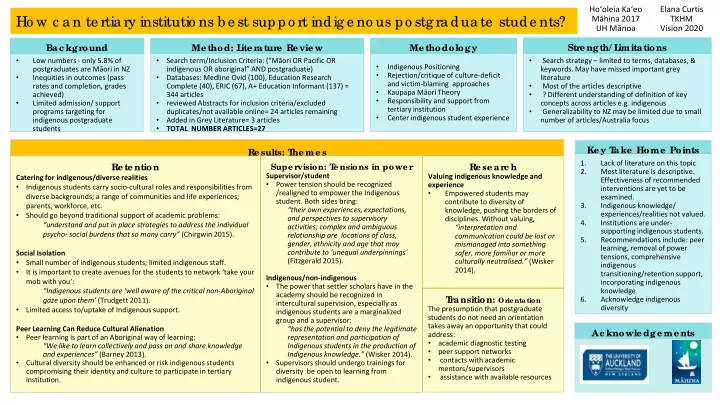

Hoʻoleia Kaʻeo Elana Curtis Ma̅hina 2017 TKHM Ho w c a n te rtia ry institutio ns b e st suppo rt indig e no us po stg ra dua te stude nts? UH Ma̅noa Vision 2020 Str e ngth/ L imitations Bac kgr ound Me thod: L ite r atur e Re vie w Me thodology • Low numbers - only 5.8% of • Search term/Inclusion Criteria: (“Ma̅ori OR Pacific OR • Search strategy – limited to terms, databases, & • Indigenous Positioning postgraduates are Ma̅ ori in NZ indigenous OR aboriginal” AND postgraduate) keywords. May have missed important grey • Rejection/critique of culture-deficit • Inequities in outcomes (pass • Databases: Medline Ovid (100), Education Research literature and victim-blaming approaches rates and completion, grades Complete (40), ERIC (67), A+ Education Informant (137) = • Most of the articles descriptive • Kaupapa Ma̅ori Theory achieved) 344 articles • ? Different understanding of definition of key • Responsibility and support from • Limited admission/ support • reviewed Abstracts for inclusion criteria/excluded concepts across articles e.g. indigenous tertiary institution programs targeting for duplicates/not available online= 24 articles remaining • Generalizability to NZ may be limited due to small • Center indigenous student experience indigenous postgraduate • Added in Grey Literature= 3 articles number of articles/Australia focus students • TOTAL NUMBER ARTICLES=27 Ke y T ake Home Points Re sults: T he me s 1. Lack of literature on this topic jjj Supe rvision: T e nsions in powe r Re se ar c h Re te ntion 2. Most literature is descriptive. Supervisor/student Valuing indigenous knowledge and Catering for indigenous/diverse realities Effectiveness of recommended • Power tension should be recognized experience • Indigenous students carry socio-cultural roles and responsibilities from interventions are yet to be /realigned to empower the Indigenous • Empowered students may diverse backgrounds; a range of communities and life experiences; examined. student. Both sides bring: contribute to diversity of parents, workforce, etc. 3. Indigenous knowledge/ “their own experiences, expectations, knowledge, pushing the borders of experiences/realities not valued. • Should go beyond traditional support of academic problems: and perspectives to supervisory disciplines. Without valuing, 4. Institutions are under- “understand and put in place strategies to address the individual activities; complex and ambiguous “interpretation and supporting indigenous students. psycho- social burdens that so many carry” (Chirgwin 2015). relationship are locations of class, communication could be lost or 5. Recommendations include: peer gender, ethnicity and age that may mismanaged into something learning, removal of power contribute to ‘unequal underpinnings’ Social Isolation safer, more familiar or more tensions, comprehensive (Fitzgerald 2015). culturally neutralised.” (Wisker • Small number of indigenous students; limited indigenous staff. indigenous 2014). • It is important to create avenues for the students to network ʻtake your transitioning/retention support, Indigenous/non-indigenous mob with youʻ : incorporating indigenous • The power that settler scholars have in the knowledge “Indigenous students are ‘well aware of the critical non-Aboriginal academy should be recognized in T r ansition: Or 6. Acknowledge indigenous gaze upon them’ ( Trudgett 2011). ie ntation intercultural supervision, especially as diversity The presumption that postgraduate • Limited access to/uptake of Indigenous support. indigenous students are a marginalized students do not need an orientation group and a supervisor: takes away an opportunity that could Peer Learning Can Reduce Cultural Alienation “has the potential to deny the legitimate Ac knowle dge me nts address: Peer learning is part of an Aboriginal way of learning: • representation and participation of • academic diagnostic testing “We like to learn collectively and pass on and share knowledge Indigenous students in the production of peer support networks • and experiences” (Barney 2013). Indigenous knowledge.” (Wisker 2014). • contacts with academic • Cultural diversity should be enhanced or risk indigenous students • Supervisors should undergo trainings for mentors/supervisors compromising their identity and culture to participate in tertiary diversity be open to learning from assistance with available resources • institution. indigenous student.
Re fe re nc e s Barney, K. (2013). ‘Taking your mob with you’ - giving voice to the experiences of Indigenous Australian postgraduate students. Higher Education Research & Development, 32(4), 515-528 Chirgwin , S. (2010). Meeting needs and moving around mountains: The issues surrounding research training for our future indigenous researchers. 9 th , 149. Chirgwin, S. K. (2015). Burdens too difficult to carry? A case study of three academically able Indigenous Australian Masters students who had to withdraw. International Journal of Qualitative Studies in Education, 28(5), 594-609.Day, D. (2007). Enhancing success for Indigenous postgraduate students. Synergy, 26, 13-18. Fitzgerald , T. (2005). Partnership, protection and participation: Challenges for research supervision in Aotearoa/New Zealand. Supervising Postgraduate Research : Contexts and Processes, Theories and Practices, 30. King M; Munt R; Eastwood A. (2007).The impact of a postgraduate diabetes course on the perceptions Aboriginal health workers and supervisors in South Australia. Contemporary Nurse. 25(1-2):82-93, 2007 May-Jun.
Re fe re nc e s Continue d Theodore, R., Tustin, K., Kiro, C., Gollop, M., Taumoepeau, M., Taylor, N., . . . Poulton, R. (2016). Maori university graduates: Indigenous participation in higher education. Higher Education Research and Development, 35(3), 604-618. Trudgett , M. (2009). Build it and they will come: Building the capacity of indigenous units in universities to provide better support for indigenous australian postgraduate students. Australian Journal of Indigenous Education, 38, 9-18. Trudgett , M. (2010). Supporting the Learning Needs of Indigenous Australians in Higher Education: How can they be best achieved?. International Journal Of Learning, 17(3), 351-361. Trudgett , M. (2011). Western places, academic spaces and indigenous faces: Supervising indigenous australian postgraduate students. Teaching in Higher Education, 16(4), 389-399. Wisker, Gina; Robinson, Gillian (2014) Examiner practices and culturally inflected doctoral theses. Discourse; v.35 n.2 p. 190-205; May 2014
Recommend
More recommend